News
Witnesses expose lack of coordination in counter-terror moves
Officers from the Attorney General’s Department appeared before the Parliamentary Select Committee (PSC) investigating the Easter Sunday attacks this week to defend the department’s position.
They said they came to clear a wrong impression created in society over the department’s role with regard to a file related to the National Thowheed Jamaath (NTJ). The documents in the file had been forwarded to the AG’s Department by the Terrorist Investigation Division (TID) in 2017 and 2018.
Giving evidence on behalf of the AG’s Department were Deputy Solicitors General (DSG) Dileepa Peiris and Azad Navavi.
Army Commander Lt. General Mahesh Senanayake also testified this week, appearing before the commission for the second time. Others who gave evidence this week were former Defence Secretary Kapila Waidyaratne and Acting TID Director Superintendent of Police Jagath Vishantha.
Following are highlights of the evidence given by the witnesses: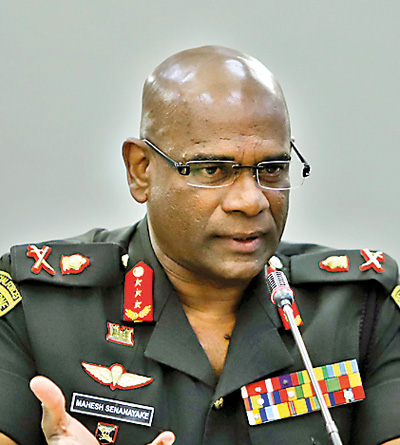
Lt. Gen. Mahesh Senanayake, Army Commander:
I can’t give a timeframe on how long it’ll take to eradicate this threat. I can’t say if it’ll take three months, six months or a year to do it. But the lessons we have learned from this, along with our experiences from the 30-year war, have allowed us to make good progress in revamping our intelligence agencies within a short space of time. It’ll still take us some time to build up a national intelligence network, but I am satisfied that at least the process has now started.
I believe the Chief of National Intelligence (CNI), irrespective of the person occupying that position, should be empowered to take action after analysing intelligence collected from all agencies. The person holding the rank should be given powers to act as an analyst of the Government and then take action based on those findings.
We have been collecting information and reporting on the spread of this Islamic extremist network from about 2017. We brought this to the attention of the Ministry of Defence. We also shared information with the CNI, the State Intelligence Service (SIS) director and the Inspector General of Police (IGP). We wrote to them recommending the arrest of certain individuals. This is because the army is not empowered to arrest suspects when there is no State of Emergency.
As we had already identified those behind this network, we were able to arrest so many of the suspects so soon after the Easter attacks. There are still a few who are at large.
I attended the Intelligence Coordination Meeting held on April 9. I did not see the letter sent to the CNI and the IGP (warning of an impending attack) till after the incident. I regret that I was not made aware of the contents of this letter, which I only saw on social media after the Easter Sunday attacks. If I had known of it, I would have definitely raised the matter at the Intelligence Coordination Meeting. Moreover, using the intelligence we already had in our possession, we could have utilised our resources to contain the situation.
There was a degree of mistrust between the army and the then leadership of the TID prior to the Easter Sunday attacks. This was following the arrest of several military intelligence operatives in connection with various cases. We have no issue regarding the court cases and are cooperating with those investigations. However, it did create mistrust between Military Intelligence and TID. We also did not receive the level of cooperation we expected from the TID when investigating an LTTE revival attempt after 2015. These issues have now been resolved under the present TID leadership.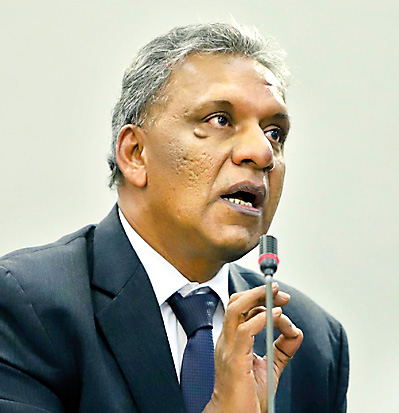
Kapila Waidyaratne, former Secretary to Ministry of Defence:
On October 23, 2018, the President informed me to convene a National Security Council (NSC) meeting. I remember that date well since that was the last NSC meeting I convened, as I resigned from my post on October 30, 2018. What usually happens is that the President informs the date and time of the meeting. Thereafter, I ask the CNI to inform those who should attend. At the time, the CNI post was held by retired DIG Sisira Mendis.
The President told me to convene an NSC meeting and added that the IGP need not attend. It is not my place to question the President on why he does not want someone to attend the meeting. However, I knew that an investigation was ongoing at the time based on accusations made by an individual named Namal Kumara. I also knew that the IGP’s name had been mentioned in relation to this investigation and that a statement had been recorded from him.
CNI cheif Sisira Mendis called and told me he could not convey this message to the IGP. I told him that I would do it. The IGP called at about the same time. I told him that he need not attend the NSC meeting. He asked me if he should send someone to represent him and I said that too was not necessary.
I must inform the Committee that the IGP actively participated in all NSC meetings held until then. The October 23 meeting was the only NSC meeting that he was not invited for during my tenure as Defence Ministry Secretary. I cannot speak about meetings held afterwards.
The Prime Minister was invited for all NSC meetings held during my tenure. There are no attendance sheets for these meetings, but I recall that the PM came for most meetings. The State Defence Minister did the same.
Dileepa Peiris, Deputy Solicitor General: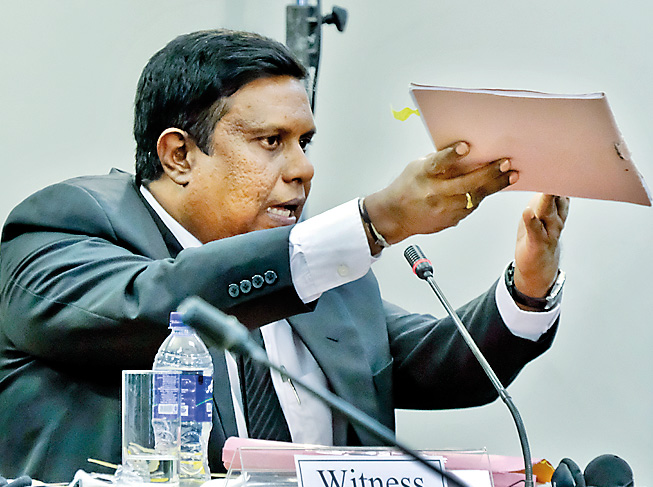
On March 27, 2017 the AG received a letter from an organization called Al Haj Abdul Jawadh Alim Waliyyullah Trust signed by its Secretary Moulavi K.R.M. Sahlan. The letter was hand delivered to the AG’s Department. Copies of the letter had also been delivered to the then Justice Minister Wijeyadasa Rajapakshe, IGP and the TID chief. The then AG and present Chief Justice Jayantha Jayasuriya sent me a note on April 3, 2017 to open a file on this.
The letter from the Waliyyullah Trust stated that an extremist Islamic group named National Thowheed Jamaath (NTJ) led by an individual named Zahran was obstructing peaceful Muslims from practising their religion in Kattankudy and asked for the involvement of law enforcement authorities to bring the situation under control. The letter also had some photographs attached to it, including one showing some individuals armed with swords on the road and another of an individual in hospital with cut injuries.
On the instructions of the Attorney General, I sent a letter dated June 22, 2017 to the IGP, asking the police to send us a detailed report on any investigation they had launched on the NTJ. We have not received a response to this letter from anyone in the police even up to now.
It was only after the Easter Sunday attacks that I learned that the TID was conducting an investigation on the NTJ. There was no bar for the IGP to send a reply to me saying the TID was conducting a probe on the NTJ. We later found that Moulavi Sahlan, on the very same day he handed over the letter to our department, had gone to the TID and handed over a copy of the same letter. As it happened, it took the TID two years to record his statement.
The first volume of the file that the TID sent to the AG’s Department on the NTJ was incomplete. All it contained were some pictures taken from Facebook and transcripts of some speeches. How can you ban the NTJ or arrest Zahran based on that? The second volume noted that they could be prosecuted based on provisions of the Penal Code.
The TID could have arrested them if they suspected them to be terrorists. There’s no need for them to ask us for advice.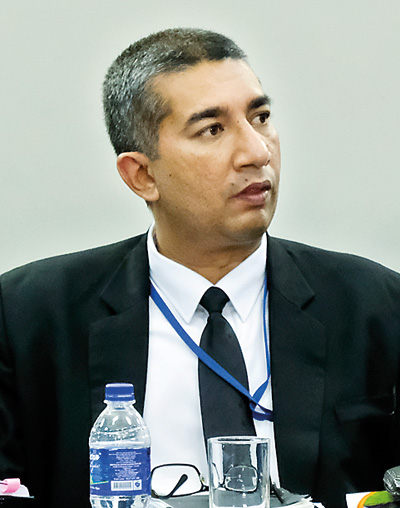
Azad Navavi, Deputy Solicitor General:
The first volume submitted by the TID on Zahran and the NTJ did not contain any investigative material of evidentiary value. The second volume contained transcripts of 14 speeches. It made no mention of an ongoing investigation. I am puzzled as to why the TID did not share all the information it had with us.
There are video clips and speeches by Zahran in the volumes the TID sent us. However, as per the provisions of the ICCPR (International Covenant on Civil and Political Rights) Act, we need a lay person stating to us the speeches were racially instigating. If an AG Department counsel says so then he would be a witness.
From the AG’s Department’s point of view, a letter was sent to the IGP on this subject on June 22, 2017 asking for more information.
We completely reject the accusation that the Easter Sunday attacks could have been averted if the AG’s Department had adviced the TID to arrest Zahran under the ICCPR Act. Two open warrants were already out for Zahran’s arrest by the time the attacks took place. One was issued by the Batticaloa Magistrate’s Court in July 2, 2017 over the clash in Kattankudy. The second open warrant was issued by the Colombo Magistrate’s Court in July, 2018.
Assuming without conceding that the AG had also advised the police to move for a warrant, it would still have not made a difference because the law enforcement agencies, with two open warrants, were unable to arrest Zahran for almost two years.
Superintendent Jagath Vishantha: Acting TID Director
Former TID Director DIG Nalaka Silva established a Research and Analysis Unit at the TID in February, 2017. Its main focus was to monitor Buddhist and Muslim extremist groups and LTTE revival attempts.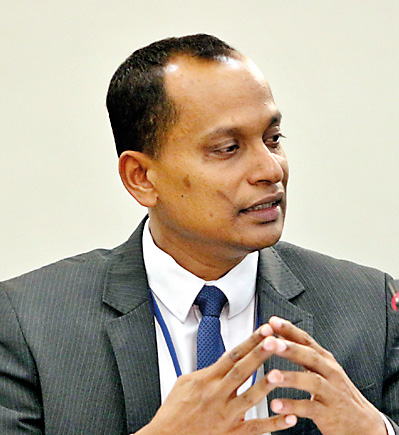
Zahran used the Digana incidents to his advantage. He published a lot of content on Facebook soon afterwards and we noticed that his posts were generating a lot ‘likes’ and comments.
We sent several teams to arrest Zahran. They went to his Kattankudy residence and his wife’s residence in Kekunagolla. However, none of the teams managed to corner Zahran.
Due to the efforts of DIG Silva, TID received a vehicle donated by the Japanese Government in 2018. It was fitted with hi-tech surveillance equipment. We even trained some officers to use it. However, DIG Silva was arrested within a few months of the vehicle being donated and we were told by the Criminal Investigation Department (CID) officers handling the case not to use the vehicle till the investigations were concluded.
As such, we have not able to make use of the vehicle so far.
Dr Jayampathy Wickramaratne served as Acting Chairperson of the PSC this week. Other members who were present were Rauff Hakeem, Prof Ashu Marasinghe, Dr Nalinda Jayathissa, M A Sumanthiran and Field Marshal Sarath Fonseka.
Pix by Ishanka Sunimal
Pix by Ishanka Sunimal

